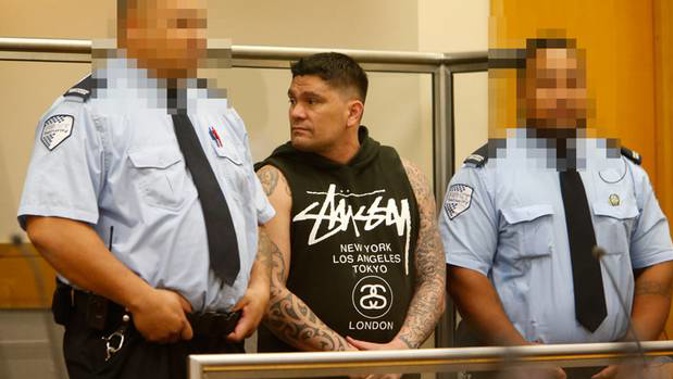
The ringleader of New Zealand's largest meth factory has been denied his desired day in court after an appeal of his convictions was dismissed today.
Brownie Harding had challenged his convictions in the Court of Appeal which had led to a more than 28-year prison term.
He was convicted after police arrested him in 2014 for supervising the production of 6.5kg of methamphetamine. It is the largest single case of meth manufacturing to have reached New Zealand's courts.
Through lawyer Peter Eastwood in the Court of Appeal last month, Harding argued he was driven and pressured by his then counsel Maria Pecotic to bring about an easy resolution.
Eastwood added Harding's former counsel was in a position of conflict because she was also acting for members of Harding's family. There was also pressure from the judge to plead guilty, Harding claimed.
Other grounds for the appeal included the claim Harding, a patched Head Hunter gang member, had been given misleading legal advice about the evidence required to prove the charges of manufacturing meth. He also claimed there was weak evidence that meth - as opposed to ephedrine - was being manufactured in the Northland drug lab.
Harding also appealed on the grounds that he did not receive the audio transcript books before entering his guilty pleas.
Eastwood told the three Court of Appeal judges that the catalyst for Harding admitting the offending was he was under the impression prosecutors would go easier on his family if he took responsibility for the crimes.
Two of Harding's teenage sons were also charged by police, who began investigating a tip about members of the Head Hunters' East Chapter in Auckland operating a meth factory near Whangārei.
"Mr Harding wants his day in court. He wants his trial," Eastwood said.
However, today the Court of Appeal judges, Justice Patricia Courtney, Justice Graham Lang and Justice Geoffrey Venning dismissed Harding's appeal.
"It cannot reasonably be concluded that the judge's comments gave an indication either way as to what Mr Harding ought to do," the judgment reads.
"It is very likely that Mr Harding was influenced by family considerations in making the decision to plead. But we do not accept that there was any improper influence by Ms Pecotic. Nor do we consider that, at the pre-trial stage, there was any conflict between Mr Harding and the other members of his family for whom Ms Pecotic was acting.
"Mr Harding fully understood the nature of the charges that he was pleading to and did so with the benefit of comprehensive advice as to the consequences," the judgment reads.
Harding's arrest came after police were covertly watching a bugged house in Waiotira, between Whangārei and Paparoa, from September to December 2014.
He pleaded guilty to six charges of manufacturing meth, two of conspiring to supply meth, one of possession of meth for supply, one of supplying pseudoephedrine and one of participating in an organised criminal group.
Harding attempted but ultimately failed to vacate his guilty pleas on some of the manufacturing charges, arguing he had produced only ephedrine.
When sentencing the father of seven in August 2017, Justice Simon Moore said Harding's meth "factory" was used deliberately to "accommodate your sophisticated and well-equipped laboratory to manufacture massive quantities of methamphetamine".
Harding changed his story throughout the court proceedings and disputed almost all of the Crown's evidence against him.
Harding's case was part of the police's Organised and Financial Crime Agency of New Zealand (OFCANZ) investigation code-named Operation Easter, which was launched in mid-2014.
The operation was also the first police investigation in New Zealand to use a covert audio listening device inside an active meth lab.
Police moved in on Harding in December 2014 and arrested him while driving his Mercedes Benz. Inside the car officers also found a sports bag with nearly 2.3kg of meth inside.
Harding's two teenage sons, Evanda and Tyson, were also in the car and working on instructions from their father to take the drugs to the Head Hunters' gang pad in Ellerslie.
At just 18, Evanda was later jailed for more than nine years for his role, while Tyson was discharged on an allegation of possession of methamphetamine for supply.
Justice Moore had considered imposing the maximum sentence of life imprisonment on their father but decided against it "by a fine margin".
"To put it in perspective, it is the largest single case of manufacturing to have come before the courts in New Zealand, and that is by a very substantial margin indeed," he said.
When sentencing Harding, Justice Moore noted that the gangster had never smoked meth himself and "embarked on this exercise to accumulate wealth".
"Even more concerning is your total lack of remorse for what you have done despite your comment that you 'hate meth'," the judge said.
"You insist you did nothing wrong and even more startling you are recorded as saying that you would do it all again. That is a breath-taking statement."
Harding was called the "boss" of the operation, but there was evidence he was reporting to a higher-ranking criminal.
In one recorded conversation, Harding was "incandescent with rage" after some of the drugs were lost and he was forced to explain a $200,000 loss "down in Auckland".
Take your Radio, Podcasts and Music with you









